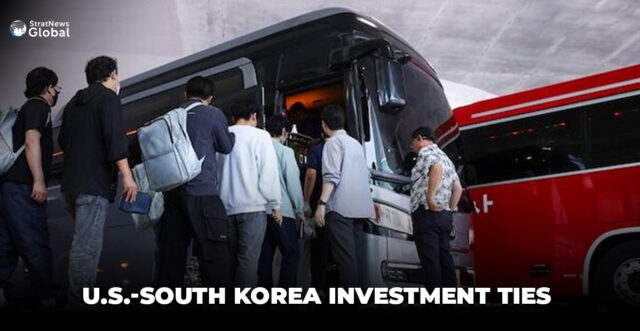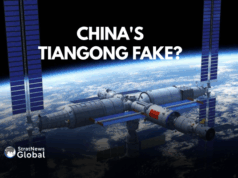The United States has reaffirmed its commitment to strengthening U.S.–South Korea investment ties while clarifying rules on short-term worker visas.
The move follows a major immigration raid at a South Korean-run battery facility in Georgia last month.
But U.S. officials at a working group meeting offered no new answers to South Korea’s argument for wider access to U.S. visas for specialty workers, despite reaffirming a commitment to advance the trade and investment partnership, the ministry said.
The working group was set up in the aftermath of a massive immigration raid at a Hyundai Motor (005380.KS), car battery facility under construction in the U.S. state of Georgia in September, where hundreds of South Korean workers were arrested.
The arrests, which stunned the South Korean government and public, highlighted the lack of access to the right class of U.S. visas for specialised South Korean workers needed at investment sites.
The U.S. side, made up of officials from the Departments of State, Homeland Security and Commerce, made clear that South Korean workers can install, service and repair equipment needed as part of South Korean business investment in the U.S., using the ESTA visa waiver programme and the B-1 temporary visas, South Korea’s foreign ministry said.
“The clarification on B-1 visas essentially confirms the route we were already using for short-term assignments under six months, such as equipment installation,” Mira B. Park, head of the immigration department at the Visa Service Company, told Reuters.
“However, in practice, even with a visa properly issued by a U.S. consulate and supported by the right documentation, we continue to see cases where workers are denied entry at the port of entry…That said, this measure does not solve the deeper issue,” she said.
A new section dedicated to visas related to South Korean businesses will be set up at the U.S. embassy in Seoul and U.S. immigration authorities will open a new channel with South Korean missions to better coordinate visa matters, according to the foreign ministry.
The move can be a short-term fix to visa issues, but the U.S. needs to create a new visa type or increase visa quotas for skilled workers in Korea, said Park Tae-sung, vice chairman of Korea Battery Industry Association, whose member companies include LG Energy Solution.
“This would help alleviate uncertainty about workers entering the U.S. and their fears about getting denied U.S. entries at U.S. airports,” Park told Reuters.
LG Energy Solution (373220.KS), opens new tab, which suspended work on its joint Georgia factory with Hyundai after the September raid, said: “We are grateful for the government’s prompt support, and we will thoroughly prepare and work hard to normalise the construction and operation of our plants in the United States”.
Legal Constraints
The U.S. officials said a more fundamental change to U.S. visa systems to accommodate Seoul’s demand for clearer and more certain access for its specialty workers faced “practical legislative constraints,” the South Korean ministry said.
South Korea has pushed for years for a bill that would create or expand visa categories to accommodate skilled South Korean nationals who need to visit the United States.
That bill has had difficulty getting through Congress because visas are linked to immigration, one of the most sensitive subjects in the United States, according to South Korea’s foreign ministry.
U.S. Deputy Secretary of State Christopher Landau stressed the “critical role” of the skilled workers of South Korean companies investing in the U.S. during the group’s first meeting in Washington, the State Department separately said.
The U.S. was committed to encouraging investment by companies from South Korea as one of the leading foreign investors in the country, the department said.
The U.S. is working with Seoul on “processing appropriate visas for qualified ROK visitors to continue investing in America, in compliance with U.S. laws,” it said in a statement, referring to South Korea.
The working group will hold further meetings, South Korea’s foreign ministry said.
(With inputs from Reuters)





